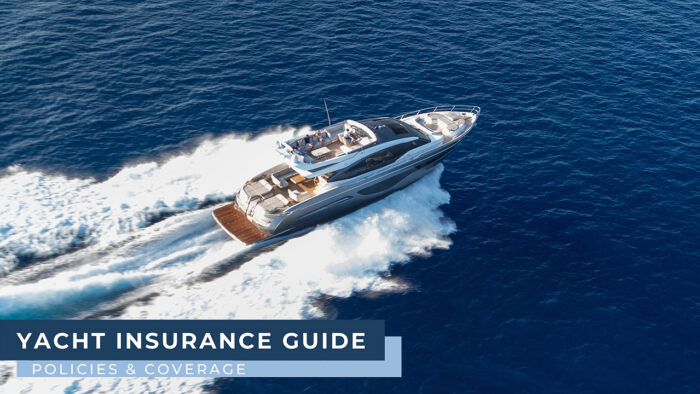Find exactly what you're looking for...

What is yacht insurance? Much like car and home insurance, yacht insurance is an insurance policy that provides liability coverage on high-end pleasure boats. This policy typically provides liability for bodily injury or damage to the property of others and damage to personal property aboard the vessel.
Yacht insurance is provided for vessels considered to be 27 feet or larger (26’ and smaller fall under boat insurance, which varies in coverage). Most yacht insurances are more specialized because of extended travels and higher risk exposures. Broader coverage designs to shield you from the effects of maritime law. We’ve outlined the basics of yacht insurance below; for vessels considered to be 27 feet and larger. Please note, every yacht insurance policy is written differently and can vary in the amount of coverage it provides.
Firstly, there are two basic types of yacht insurance— an agreed value and actual cash value policies. For an agreed value, the policy covers all damages, except for sails, outboard motors, canvas covers, cushions, or other specified items. It does not reflect depreciation or market value, which means you will get a greater settlement in the event of a claim. On the other hand, an actual cash value policy costs less upfront, but factors in depreciation and market value. To clarify, the insurance policy will only pay up to the actual cash value of the boat at the time it is declared a total loss or partial loss.
 With a yacht policy, you’ll want to be sure two things are included. The first being hull insurance. This section is an all-risk direct damage coverage that creates a broad insuring agreement. It will include the agreed amount hull coverage; in other words, all parties agree at the time the policy is written on the value of the vessel and that value will be paid in the event of a total loss.
With a yacht policy, you’ll want to be sure two things are included. The first being hull insurance. This section is an all-risk direct damage coverage that creates a broad insuring agreement. It will include the agreed amount hull coverage; in other words, all parties agree at the time the policy is written on the value of the vessel and that value will be paid in the event of a total loss.
Furthermore, a yacht policy should include replacement cost coverage on partial losses (except sails, canvas, batteries, outboards, and sometimes outdrives, which depreciate.) Protection and indemnity insurance is the broadest of all liability coverages, and because maritime law is unique, you will need coverage that is designed for those exposures. Moreover, most yacht insurance policies offer protection to permissive users, captain, and crew liabilities, along with the Jones Act; a federal law that allows a seaman who gets injured on the job to bring a suit for damages against his/her employer.
Your yacht policy may or may not include these standard add-on coverages. They will also have standard deductibles and average limits that vary by provider:
 Only a handful of states require you to obtain yacht insurance. However, many marinas require a form of insurance if you wish to use a slip or mooring. In addition, if you are financing the purchase of your yacht, your lender will also require proof of insurance.
Only a handful of states require you to obtain yacht insurance. However, many marinas require a form of insurance if you wish to use a slip or mooring. In addition, if you are financing the purchase of your yacht, your lender will also require proof of insurance.
Typically, a deductible will be a certain percentage of the insured value. As an example, a 1% deductible plan for a $100,000 yacht, would have a $1,000 deductible. Most providers allow a maximum deductible of 3% for any hull damage. However, deductibles for a total loss, marine electronics loss, or a windstorm loss can vary depending on your particular policy.
Depending on your provider and coverage plan, yacht insurance could range anywhere from as little as $75 to as much as $500 per year. Discounts are often available on your premiums for signing up for multiple policies through a single insurer, taking a boating safety course, receiving a boater-education card or license, limiting your boating to a specific geographic area, or for having a good driving record. Some insurers even offer diminishing deductibles for each year in which you do not file a claim.
Yacht policies have warranties, including the seaworthiness, navigation limits territories, and navigation lay-up limits. If you breach the warranties in the policy, such as promising not to go outside your navigational limits, not to use your boat during the lay-up period, not to use your boat for anything but private pleasure use, and you do not have this coverage and experience a loss, you don’t get compensation for that loss.
In 2006, Galati Yacht Sales entered into a joint venture with Baldwin Krystyn Sherman Insurance to offer marine insurance to our clients. Working together, we aggressively negotiate the best terms, conditions, and premiums for our clients. Purchasing a boat is a big decision but affords you some of the greatest adventures and memories of your life. Learn more by clicking the button below.
Compare (0/3)